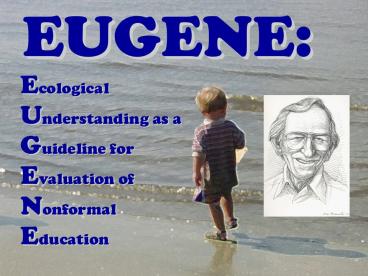Options - PowerPoint PPT Presentation
1 / 21
Title: Options
1
(No Transcript)
2
(No Transcript)
3
(No Transcript)
4
Options
- Choose existing instrument that fits
- Develop new instrument
- Standardize learning objectives and employ a
turnkey (or standardized) evaluation
5
(No Transcript)
6
(No Transcript)
7
Develop a simple instrument based on the
principles of ecology
8
Pencil and paper administration Five minutes Pre
and posttest Indicates knowledge of ecological
principle(s)
9
Ecology principles widespread?
of surveyed activities that include 1 or more
ecology principles ( activities in green)
Project Wild 100 28 Project Wet
95.7 23 PLT 96.9 32 Ecosystem Matters
100 8 Sewee Earth Stewards 100 3
10
University of Georgia Institute of
Ecology Participated in identification of
principles and validation of statements Will
continue to participate
11
Principle of Adaptation
- The way a life system looks and behaves is not a
random occurrence or accident, it is the result
of millions of years of changing to better
survive in a given environment.
http//cmex-www.arc.nasa.gov/VikingCD/Puzzle/Advan
ced.htm
12
Principle of Diversity
- Over time, changes in environmental conditions
have led to the development of variety within
each level of organization.
http//www.ucmp.berkeley.edu/education/exploration
s/tours/intro/Introkto4/tour2.html
13
Principle of Energy Flow
- Energy cannot be created, destroyed, or recycled
in an ecosystem, and energy quality is always
degraded to less-useful energy after it is
converted from one form to another. Life depends
on the one-way flow of high-quality energy from
the sun through Earths life systems and
eventually back into space as low-quality heat.
14
Principle of Growth Development
- The living components in an environment follow a
basic pattern of growth where upon reaching the
maximum number of living things which that
environment can support, the rate of growth
slows.
http//www.selfbuildit.co.uk/building_land.htm
http//www.junglewalk.com/frames.asp
15
Principle of Limits
- Ecological processes are altered the environment
can withstand much stress and abuse, but there
are limits to how much can be tolerated by the
living systems whose niche occurs there.
http//web.uct.ac.za/depts/stats/adu/oilspill/pic0
6.htm
16
Principle of Behavior
- The different ways organisms act can have
different impacts on the survival of organisms.
Living systems have behavioral responses to
stress and disturbances responses that enhance
survival.
http//www.roxbury.org/ems/images/photo6.jpg
17
Principle of Regulation
http//www.globalchange.umich.edu/globalchange1/cu
rrent/labs/pred_prey/lab9.html
- Energy is spent or a signal is sent to increase
or decrease some function in order to keep the
environment balanced.
18
Principle of Emergent Properties
- When different levels of organization are
functioning together, new properties are created
that were not operational at lower levels.
http//savetheprairiesociety.org/Kidsonline/laecos
ystems.html
http//savetheprairiesociety.org/Kidsonline/laecos
avanna.html
19
When an animal eats a plant, it is getting energy
that came from the sun. energy flow Even over
thousands of years, the leaves of a tree species
can never change their shape. adaptation Life
in the ocean would not change if the oceans
temperature rose without stopping. limits An
ecosystem would not change if a new type of
organism moved into it. emergent properties
20
Sewee Association/Sewee Environmental Education
Center Piloting EUGENE since 2004 (4th
grade) Fall, Spring, and Summer
administrations US Forest Service Statistical
analysis
21
MEERA EUGENE will be placed on the web site as a
pilot (fall 2007?) (pending funding)































